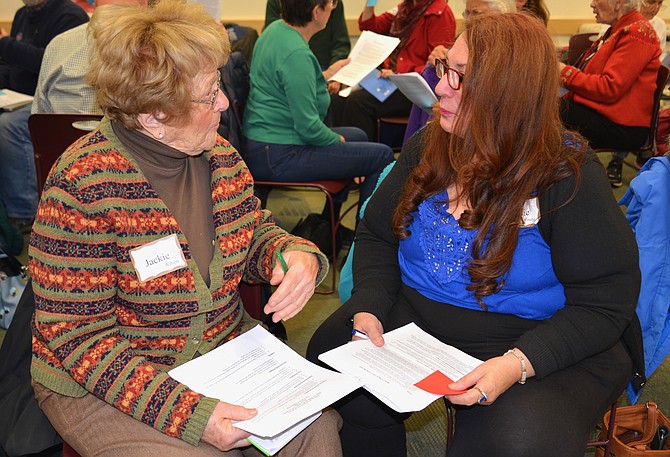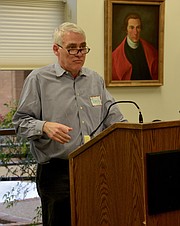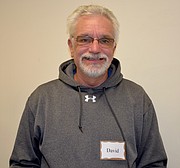Jackie Wilson of McLean and Joanie Young of Oakton practice some of the listening and speaking skills offered at the Better Angels workshop on “Talking Across the Political Divide” held at the Patrick Henry Public Library in Vienna. “This is a good start,” said Wilson. “We need to find the common things that hold us together.” Photo by Andrea Worker.
“Remember, you’re trying to understand the other’s point of view, how they came to their positions, not judge or disparage them.” —Catherine Fox
"We are not enemies, but friends. We must not be enemies. Though passion may have strained, it must not break our bonds of affection. The mystic chords of memory will yet swell the chorus of the Union, when again touched, as surely they will be, by the better angels of our nature." —Abraham Lincoln, 1861.
Those words, spoken by the American president in the time of the greatest discord and division in the history of the Union, are the inspiration behind the mission of the Better Angels organization, to move beyond the issues and sentiments that divide us, and find the things that unite, to find a common ground through real conversation.
The nonprofit was formed shortly after the 2016 presidential elections when David Blakenhorn, one of the founders and currently the president of Better Angels saw the writing of polarization on the wall and called David Lapp, an affiliate scholar at the Institute for American Values to ask if he would help bring a handful of Donald Trump and Hillary Clinton supporters together for a weekend of dialogue.
Even in the midst of the post-election heated emotions, the organizers found remarkable results. “We liked each other and wanted to know more about each other …we wanted to keep meeting…those red and blues invited friends to another workshop” and together they founded the first Better Angels Alliance to keep the conversation flowing.
BETTER ANGELS describes themselves as “a national citizens’ movement to reduce political polarization in the United States by bringing liberals and conservatives together to understand each other beyond stereotypes, forming red/blue community alliances, teaching practical skills for communicating across political differences, and making a strong public argument for depolarization.”
On Saturday, Jan. 19, Better Angels-trained facilitators Catherine Fox and Tony Speranza brought that mission in the form of one of Better Angels’ structured “Skills for Difficult Personal Conversations” workshops to the Patrick Henry Library in Vienna.
Perhaps unsurprisingly, the roomful of participants declined to have their particular reasons for attending quoted for the record, since a majority of them admitted that they registered for the workshop in order to improve fracturing personal relationships, and even, in a few cases, to save family relationships that were on the brink of complete breakdown due to political differences.
Unlike the day-long or even lengthier “red/blue” Better Angel workshops that are carefully crafted to include equal numbers of persons of generally opposing political viewpoints, this session was more of a “Cliff Notes” version, designed to practice some basic “safe zone” dialogue skills.
“The goals for today sound simple, but may be harder to achieve in real-life situations, maybe even in these practice sessions,” said moderator Speranza. They were:
- To learn about the perspectives, feeling and experiences of someone you care about who differs from you politically;
- To have a sense of satisfaction about how you conveyed your own perspective, feelings and experiences;
- To discover some common ground if it’s there.
Even harder to achieve in difficult conversations outside the classroom is “abandoning certain expectations,” added moderator Fox.
In order to do that, and set a tone for productive discourse, the attendees were instructed that they would have to “give up” on the following:
- That you can persuade the other person to change core attitudes and beliefs;
- That facts will be agreed on and logic followed consistently;
- That your conversation partner will match your openness.
“Remember,” Fox said, “you’re trying to understand the other’s point of view, how they came to their positions, not judge or disparage them.”
The Better Angels goal is to look for common values and concerns. Establishing a neutral conversational plane where we seek to learn something, affords “the better chance to have meaningful conversations that maintain, and sometimes even strengthen relationships, even when the speakers have opposite points of view on certain subjects.”
THE GROUP was split into pairs, one representing the “blue” side, the other the “red.” Although there were many more “blues” in the room, there were some “reds” and with the help of some role-playing scripts, a few of the “true blues” were able to take the “red” part for the sake of the exercises.
Things moved quickly from there, with the pairs sharing what went well and what was challenging after each scenario. The moderators were right. Even in simulation mode, the conversationalists acknowledged that it was difficult to not give in to emotion, to listen, and to look for the common ground rather than go on the offensive.
“But at least we are more prepared now, and know how to start and what to look for from ourselves,” said Jackie Wilson of McLean, who signed up for the workshop with her “best pal” Joanie Young of Oakton.
“This is good for me,” said Young. “People tell me I interrupt when we get into these kinds of conversations, so this is helping me think about that, holding back while the other person is talking so I can really hear them.”
“Yes, this is really important,” agreed Wilson. “In these times, we need to find every method to find a measure of peace and understanding. This is just a start.”
Wilson’s remarks were echoed by the others when the class was concluded and it was feedback time. Most wished that the session could have been longer and more in depth, with the opportunity to explore potential pitfalls that might really occur, but felt that their role-playing experiences and the information shared by the moderators was, in fact, a good start. Several said they would be on the lookout for the next, nearby available full-length “red/blue” workshop.
Better Angels’ Virginia state coordinator Mel Pine directed those interested in continuing the process to the group’s website at www.better-angels.org. Membership in the organization is only $10 per year. Pine also announced that Better Angels would be having their own “state of the union” address on Jan. 31 at 9 p.m. via web stream. Mel can be reached at mel@better-angels.org for anyone interested in more information, or interested in hosting a training session.
In the meantime, say the Better Angels, keep talking and keep listening to keep the conversation going.


